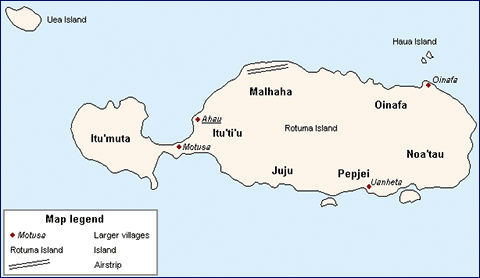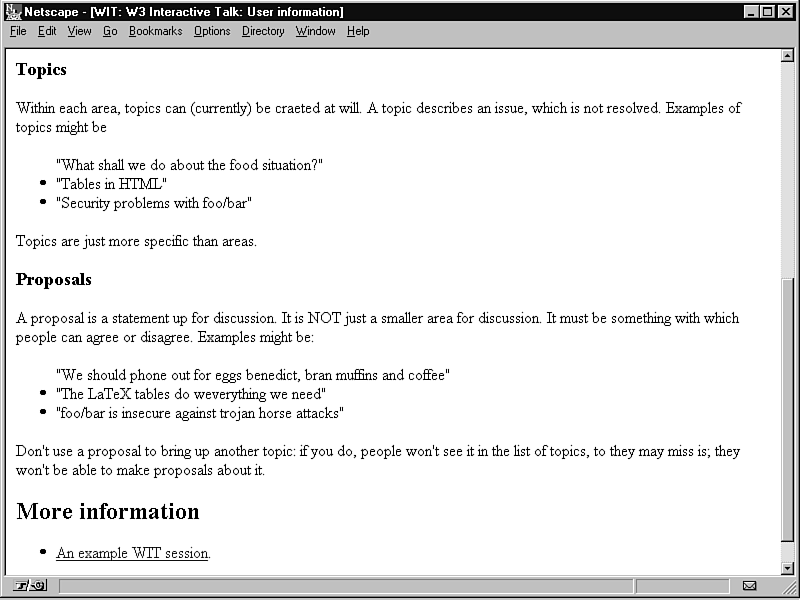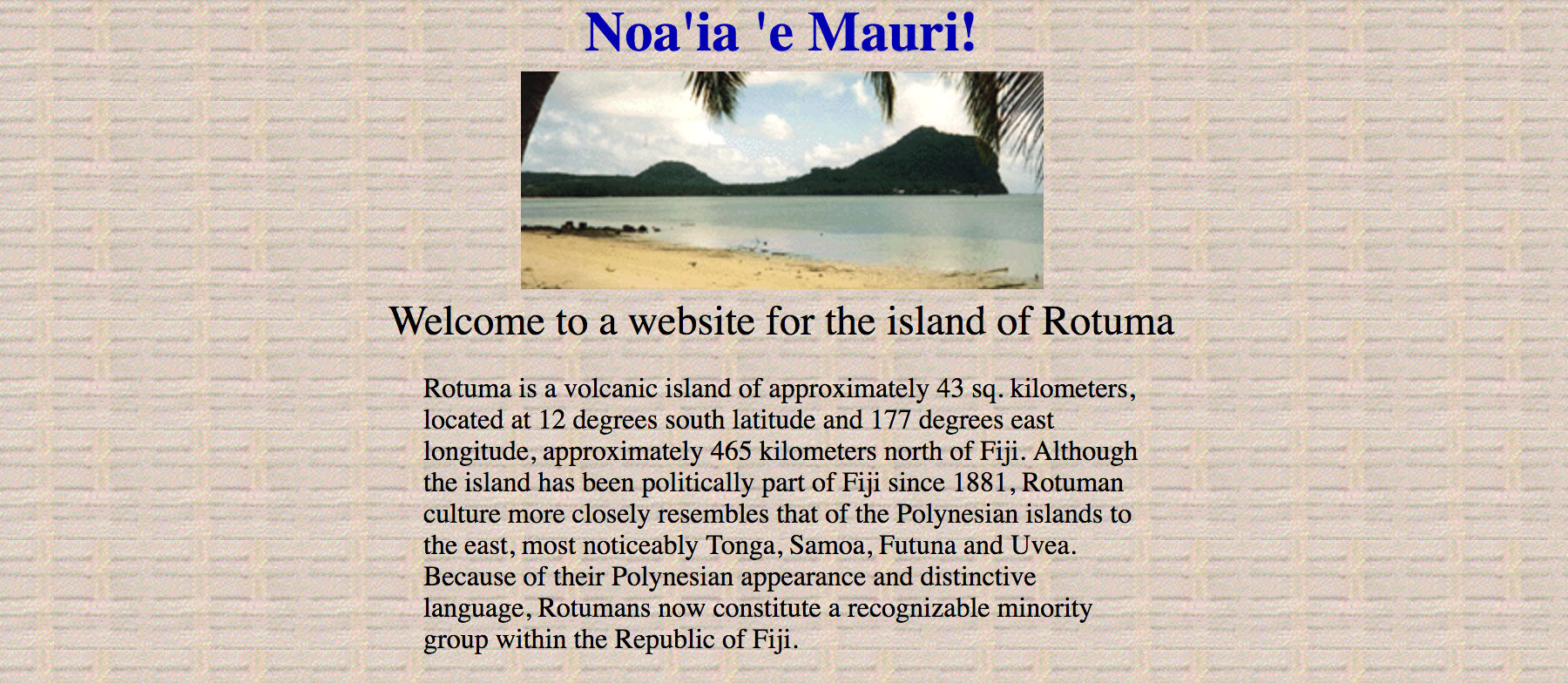Community is a founding ideal of the web, it’s part of the protocol’s very DNA. In its finest moments, the web can be a space of synthesis, one able to transcend any distance to match it’s namesake and connect people. Many have found themselves caught in this kind of web. The Rotumans for instance.
For those unaware, Rotuma is a small group of islands north of Fiji. Politically affiliated with Fiji, Rotumans are fairly scattered geographically. Some live on Rotuma island and surrounding islands, but the majority live abroad, either in Fiji or greater distances, like Australia, New Zealand and beyond. It’s no question that the population is physically dispersed. But the Rotuman identity remains firm in the hearts of many citizens regardless of location.

Alan Howard is a bit of an expert on Rotuma. He teaches about Polynesian culture, and specifically Rotuma, as a professor at the University of Hawaii. In 1995, he began circulating an email to some colleagues. In it, he featured some news he had gathered about Rotuma, as well as some insights into the island’s culture and history. It wasn’t long before Rotumans, both on the island and abroad, began subscribing to his mailing list. Many would even print out his bulletins and share them with regional Rotuman communities.
Howard asked for anyone and everyone to send him anything they wanted to share. He began to receive announcements by email, fax and even snail mail, which he would send out to his list. As the list grew, the world wide web caught his eye.
Howard wasn’t the only one to see the web as a logical next step for a mailing list. In fact, it had become a bit of a trend among newsletters. David and Tom Gardner, for instance, followed quite a similar path. In July of 1993 they sent out an email to 1,000 friends and family offering investment advice. They asked for a monthly subscription fee for an annual subscription to their mailing list, called The Motley Fool. Of the thousand, thirty-eight signed up. And just a little over a year later, the Gardner’s moved their growing audience from an email to a full site. They chose AOL over the World Wide Web at first, but the pattern remains the same.
With just a hacker’s spirit and a few months on his hands, Howard put together a website (RotumaNet). In some ways, the site was an extension of his mailing list. Announcements still came in from Rotuman communities around the globe and he would post that up with some other news. But the web opened up whole new possibilities for Howard. Alongside news he added photo galleries, maps, and deep dives into Rotuman politics, economics and history.
Then, Howard added a forum to the site.
In 1996, when RotumaNet hit the web, forums (or message boards) were becoming a bit of a phenomenon. As early as 1994, the W3C began experimenting with (fairly primitive) technology dubbed Interactive Talk, that allowed users to post messages and discussions through web-based forms. They mostly used the tool internally, but the technology continued to mature. It wasn’t long before forums became a cinch to install on any site. Things kind of exploded from there.

All of a sudden, message boards began to spring up everywhere. Most focused on a single niche. Take Chowhound, a message board founded that started up in 1997. Chowhound brought together food enthusiasts looking to be on the cutting edge of local culinary taste and fads. The niche was pretty narrow and the web was young, but Chowhound still began to amass a large audience. An entire community sprouted up around Chowhound, complete with unpaid moderators, unspoken social norms, and subcultures.
There were tons of these message boards. Every niche you can imagine had a website. There were groups for wine lovers (Virtual Vineyards), people with a green thumb (GardenWeb), even support groups for those suffering from cancer (The Cancer Forum). Sensing the shift to the web, the Gardner Brothers even moved The Motley Fool to the web from AOL. As it turns out, the web was perfect for these new virtual communities. It guaranteed openness, access, and at the beginning, unfettered anonymity.
On RotumaNet, Howard’s newly created forum enjoyed similar success. People poured in from around the world to share stories, exchange inside jokes and gather around groups of their peers. Being dispersed geographically no longer mattered. Groups from Rotuma, Fiji and beyond could connect with one another on a personal, and sometimes intimate, level. Howard heard stories of regional reunions. In rarer cases, some Rotumans were even able to find long-lost relatives and friends, something they never thought possible.
Unfortunately, the ugly side of the web eventually bared its teeth in the form of irresponsible users, objectionable posts, and spam. This kind of malevolent content began to permeate the web everywhere actually. As more people came online, there were some that wanted to ruin it for others.
Tools grew to meet the challenge, of course, but they could hardly keep up. By 2000, boards from such companies as Ars Technica and Yahoo had been taking major steps to remove spam from its message boards, sometimes without even receiving a complaint. In one case, investors spammed financial message boards across the web in order to drive a certain stock’s price up. They were tried for their crimes, but there are plenty of instances where this did not happen.
Offensive content of all kinds spread across the web. You can blame it on growing pains, but it often takes the form of something far more sinister. This reality hit RotumaNet as hard as any other site out there. By 1999, Howard was forced to lock his message board down, first with a registration system, then later by replacing it altogether with a bulletin board that only he could post messages to.
It is important we understand this balance of the two sides of the web. Many Rotumans have benefited greatly from the website (which still exists by the way). It has been used for the most noble of causes, as a sort of cultural glue. But this came at an unnecessary cost. The openness of the web is sometimes is used as a weapon by those who do harm.
Over the years, Rotuma has managed to preserve its island from an influx of tourism. But they opened their doors to the web and cultivated an enduring community. Like I said. The web at its finest.


Leave a Reply